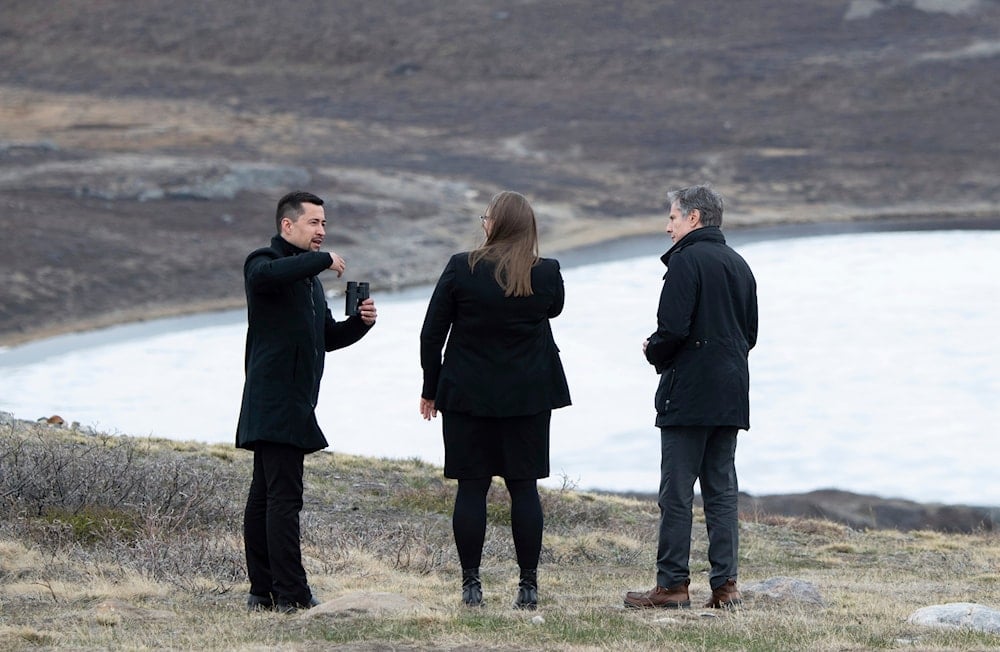Greenland leader to meet Danish king amid Trump annexation bid
Greenland's leader is set to meet the Danish king in Copenhagen, following US President-elect Donald Trump's bid for control over the Arctic island.
-

US Secretary of State Antony Blinken, right, speaks with Greenlandic Premier Mute Egede, left, and Dr. Mie Winding, center, a scientist at the Greenland Climate Research Center, as he visits the Black Ridge Viewing site in Kangerlussuaq, Greenland, on May 20, 2021. (AP)
On Wednesday, Greenland's leader is set to meet with the Danish king in Copenhagen following US President-elect Donald Trump's comments about annexing the Arctic island.
Trump, set to take office on January 20, stated on Tuesday that he would not dismiss the possibility of using military or economic measures against Denmark to bring Greenland into the United States.
Greenland's Prime Minister Mute Egede, who arrived in Copenhagen late Tuesday, had previously stated that his meeting with Denmark's King Frederik, scheduled for Wednesday, would be postponed. However, on Wednesday, the Danish royal court announced that the meeting would go ahead, without providing further details.
Greenland, home to a population of 57,000, has been a part of Denmark for 600 years, and now manages most of its internal affairs as a semi-sovereign territory within the Danish realm.
Egede has made it clear that Greenland is not for sale, and in his New Year speech, he intensified efforts for the island's independence from Denmark. Denmark has also asserted that the territory is not for sale, emphasizing that its future can only be determined by the people of Greenland.
It is worth noting that back in 2019, Trump canceled a planned visit to Denmark after Prime Minister Mette Frederiksen rebuffed his idea of the US purchasing Greenland.
Danish king alters coat of arms amid dispute with Trump over Greenland
The Danish king has surprised some historians by updating the royal coat of arms to place greater emphasis on Greenland and the Faroe Islands, a move seen by many as a subtle rebuke to US-elected Trump.
Less than a year after ascending to the throne following the abdication of his mother, Queen Margrethe, on New Year’s Eve 2023, King Frederik made a bold statement about Denmark’s commitment to retaining Greenland and the Faroe Islands as part of the kingdom.
For the past 500 years, the Danish royal coat of arms has featured three crowns, representing the Kalmar Union between Denmark, Sweden, and Norway from 1397 to 1523. These crowns also serve as a significant symbol for Sweden. However, in the updated version, the crowns have been removed and replaced with more prominent depictions of a polar bear (symbolizing Greenland) and a ram (symbolizing the Faroe Islands).
Trump's provocative ambitions signal broader strategy shift: WashPo
The Washington Post wrote on December 30 that Trump has stirred global attention with remarks suggesting territorial ambitions and unconventional foreign policy moves ahead of his second term. Among his recent comments, Trump proposed purchasing Greenland, integrating Canada as the 51st US state, and claiming control of the Panama Canal—bold statements that have raised eyebrows internationally.
Despite not yet assuming office, he has defended these ideas as part of a broader "America First" strategy aimed at bolstering US power and influence. Trump's transition spokeswoman Anna Kelly declared, "When he officially takes office, foreign nations will think twice before ripping off our country, America will be respected again, and the whole world will be safer."
His proposal to acquire Greenland, a semiautonomous Danish territory, is not entirely new. In 2019, Trump explored the idea, prompted by Estée Lauder heir Ronald Lauder. Over the weekend, Trump reiterated this position on his social media platform, Truth Social, writing, "For purposes of National Security and Freedom throughout the World, the United States of America feels that the ownership and control of Greenland is an absolute necessity."
Greenland's leaders, however, remain firm in rejecting the notion, with the island's prime minister previously stating it is not for sale.
Similarly, Trump's comments about the Panama Canal sparked controversy. Accusing Panama of overcharging shipping rates and claiming Chinese military presence in the region, Trump reignited a long-standing debate over US involvement. Panamanian President José Raúl Mulino dismissed these assertions as baseless, stating, "There are no Chinese soldiers in the canal, for the love of God. It's nonsense."

 4 Min Read
4 Min Read








